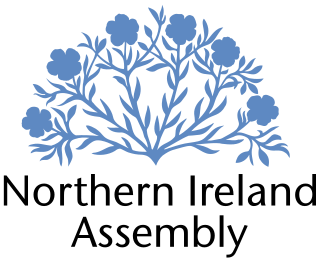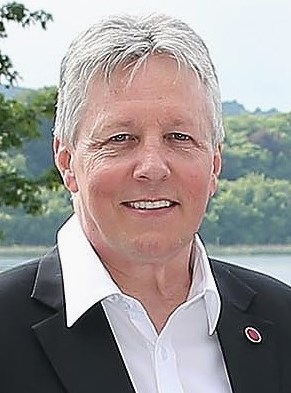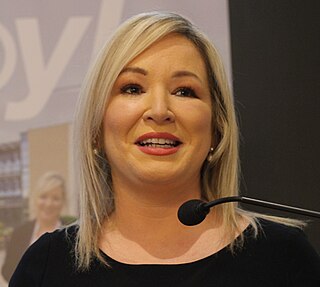
The Ulster Unionist Party (UUP) is a unionist political party in Northern Ireland. The party was founded as the Ulster Unionist Council in 1905,emerging from the Irish Unionist Alliance in Ulster. Under Edward Carson,it led unionist opposition to the Irish Home Rule movement. Following the partition of Ireland,it was the governing party of Northern Ireland between 1921 and 1972. It was supported by most unionist voters throughout the conflict known as the Troubles,during which time it was often referred to as the Official Unionist Party (OUP).

Ian Richard Kyle Paisley,Baron Bannside,was a loyalist politician and Protestant religious leader from Northern Ireland who served as leader of the Democratic Unionist Party (DUP) from 1971 to 2008 and First Minister of Northern Ireland from 2007 to 2008.

The Democratic Unionist Party (DUP) is a unionist,loyalist,British nationalist and national conservative political party in Northern Ireland. It was founded in 1971 during the Troubles by Ian Paisley,who led the party for the next 37 years. It is currently led by Gavin Robinson,who initially stepped in as an interim after the resignation of Jeffrey Donaldson. It is the second-largest party in the Northern Ireland Assembly,and won five seats in the House of Commons of the United Kingdom at the 2024 election. The party has been mostly described as right-wing and socially conservative,being anti-abortion and opposing same-sex marriage. The DUP sees itself as defending Britishness and Ulster Protestant culture against Irish nationalism and republicanism. It is also Eurosceptic and supported Brexit.

The Northern Ireland Assembly,often referred to by the metonym Stormont,is the devolved legislature of Northern Ireland. It has power to legislate in a wide range of areas that are not explicitly reserved to the Parliament of the United Kingdom,and to appoint the Northern Ireland Executive. It sits at Parliament Buildings at Stormont in Belfast.

Peter David Robinson is a retired Northern Irish politician who served as First Minister of Northern Ireland from 2008 until 2016 and Leader of the Democratic Unionist Party (DUP) from 2008 until 2015. Until his retirement in 2016,Robinson was involved in Northern Irish politics for over 40 years,being a founding member of the DUP along with Ian Paisley.
The Protestant Unionist Party (PUP) was a unionist political party operating in Northern Ireland from 1966 to 1971. It was the forerunner of the Democratic Unionist Party (DUP) and emerged from the Ulster Protestant Action (UPA) movement. It was founded and led by Ian Paisley,who also founded and led the Free Presbyterian Church of Ulster.

The Vanguard Unionist Progressive Party (VUPP),informally known as Ulster Vanguard,was a unionist political party which existed in Northern Ireland between 1972 and 1978. Led by William Craig,the party emerged from a split in the Ulster Unionist Party (UUP) and was closely affiliated with several loyalist paramilitary groups. The party was set up in opposition to compulsory power sharing with Irish nationalist parties. It opposed the Sunningdale Agreement and was involved in extra-parliamentary activity against the agreement. However,in 1975,during discussions on the constitutional status of Northern Ireland in the constitutional convention,William Craig suggested the possibility of voluntary power sharing with the nationalist Social Democratic and Labour Party. In consequence the party split,with dissenters forming the United Ulster Unionist Party. Thereafter Vanguard declined and following poor results in the 1977 local government elections,Craig merged the remainder of Vanguard into the UUP in February 1978.

James Hugh Allister is a Northern Irish politician and barrister who has served as Member of Parliament (MP) for North Antrim since the 2024 general election. He founded the Traditional Unionist Voice (TUV) in 2007 and has led the party since its formation. Prior to his election to Westminster,Allister was a member of the Legislative Assembly (MLA) for North Antrim,having been first elected in the 2011 Assembly election.

Lisburn City Council was the local authority for an area partly in County Antrim and partly in County Down in Northern Ireland. As of May 2015 it was merged with Castlereagh Borough Council as part of the reform of local government in Northern Ireland to become Lisburn and Castlereagh City Council.

Alasdair McDonnell is a retired Irish nationalist politician in Northern Ireland who was leader of the Social Democratic and Labour Party (SDLP) from 2011 to 2015,having served as deputy leader between 2004 and 2010. He was the Member of Parliament for Belfast South from 2005 to 2017,and also a Member of the Legislative Assembly (MLA) for Belfast South from 1998 to 2015. He graduated from medical school at University College Dublin in 1974.

The Northern Ireland Assembly established in 1982 represented an ultimately unsuccessful attempt to restore the devolution to Northern Ireland which had been suspended 10 years previously. The Assembly was dissolved in 1986.

The 2007 Northern Ireland Assembly election was held on Wednesday,7 March 2007. It was the third election to take place since the devolved assembly was established in 1998. The election saw endorsement of the St Andrews Agreement and the two largest parties,the Democratic Unionist Party (DUP) and Sinn Féin,along with the Alliance Party,increase their support,with falls in support for the Ulster Unionist Party (UUP) and the Social Democratic and Labour Party (SDLP).
Eric Smyth is a Northern Irish Unionist politician and Presbyterian minister.

The 2011 Northern Ireland Assembly election took place on Thursday,5 May,following the dissolution of the Northern Ireland Assembly at midnight on 24 March 2011. It was the fourth election to take place since the devolved assembly was established in 1998.

The 2010 United Kingdom general election in Northern Ireland occurred on 6 May 2010 and all 18 seats in Northern Ireland were contested. 1,169,184 people were eligible to vote,up 29,191 from the 2005 general election. 57.99% of eligible voters turned out,down 5.5 percentage points from the last general election.
Charles Boucher "Charlie" Poots was a Northern Irish unionist politician and farmer,known for being one of the founding members of the Democratic Unionist Party (DUP).

Robbie Butler is a Northern Irish unionist politician,serving as Deputy Leader of the Ulster Unionist Party (UUP) since May 2021,and a Member of the Northern Ireland Assembly (MLA) for Lagan Valley since 2016.

The 2022 Northern Ireland Assembly election was held on 5 May 2022. It elected 90 members to the Northern Ireland Assembly. It was the seventh assembly election since the establishment of the assembly in 1998. The election was held three months after the Northern Ireland Executive collapsed due to the resignation of the First Minister,Paul Givan of the Democratic Unionist Party (DUP),in protest against the Northern Ireland Protocol.

Dunmurry Cross was one of the district electoral areas in Lisburn,Northern Ireland which existed from 1985 to 2014. It was one of four Lisburn DEAs until 1993,and one of five until 2014. The district elected seven members to Lisburn City Council and formed part of Belfast West constituencies for the Northern Ireland Assembly and UK Parliament and part of the Lagan Valley constituencies for the Northern Ireland Assembly and UK Parliament.













